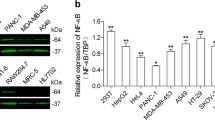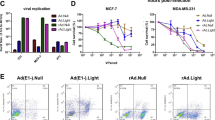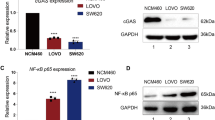Abstract
We report the anticarcinogenic, anti-aging polyphenol resveratrol activates the radio- and chemo-inducible cancer gene therapy vector Ad.Egr.TNF, a replication-deficient adenovirus that expresses human tumor necrosis factor α (TNF-α) under control of the Egr-1 promoter. Like ionizing radiation or chemotherapeutic agents previously shown to activate Ad.Egr.TNF, resveratrol also induces Egr-1 expression from its chromosomal locus with a possible role for Egr-1 promoter CC(A+T)richGG sequences in the expression of TNF-α. Resveratrol induction of TNF-α in Ad.Egr.TNF-infected tumor xenografts demonstrated antitumor response in human and rat tumor models comparable to that of radio- or chemotherapy-induced TNF-α. Although sirtuins are known targets of resveratrol, in vitro inhibition of SIRT1 activity did not abrogate resveratrol induction of Egr-1 expression. This suggests that SIRT1 is not essential to mediate resveratrol induction of Egr-1. Nevertheless, control of transgene expression via resveratrol activation of Egr-1 may extend use of Ad.Egr.TNF to patients intolerant of radiation or cytotoxic therapy and offer a novel tool for development of other inducible gene therapies.
This is a preview of subscription content, access via your institution
Access options
Subscribe to this journal
Receive 12 print issues and online access
$259.00 per year
only $21.58 per issue
Buy this article
- Purchase on Springer Link
- Instant access to full article PDF
Prices may be subject to local taxes which are calculated during checkout





Similar content being viewed by others
References
Liu C, Rangnekar VM, Adamson E, Mercola D . Suppression of growth and transformation and induction of apoptosis by EGR-1. Cancer Gene Ther 1998; 5: 3–28.
Sukhatme VP, Cao XM, Chang LC, Tsai-Morris CH, Stamenkovich D, Ferreira PC et al. A zinc finger-encoding gene coregulated with c-fos during growth and differentiation, and after cellular depolarization. Cell 1988; 53: 37–43.
Lim CP, Jain N, Cao X . Stress-induced immediate-early gene, egr-1, involves activation of p38/JNK1. Oncogene 1998; 16: 2915–2926.
Datta R, Rubin E, Sukhatme V, Qureshi S, Hallahan D, Weichselbaum RR et al. Ionizing radiation activates transcription of the EGR1 gene via CArG elements. Proc Natl Acad Sci USA 1992; 89: 10149–10153.
Park JO, Lopez CA, Gupta VK, Brown CK, Mauceri HJ, Darga TE et al. Transcriptional control of viral gene therapy by cisplatin. J Clin Invest 2002; 110: 403–410.
Lopez CA, Kimchi ET, Mauceri HJ, Park JO, Mehta N, Murphy KT et al. Chemoinducible gene therapy: a strategy to enhance doxorubicin antitumor activity. Mol Cancer Ther 2004; 3: 1167–1175.
Krones-Herzig A, Mittal S, Yule K, Liang H, English C, Urcis R et al. Early growth response 1 acts as a tumor suppressor in vivo and in vitro via regulation of p53. Cancer Res 2005; 65: 5133–5143.
Mauceri HJ, Hanna NN, Wayne JD, Hallahan DE, Hellman S, Weichselbaum RR . Tumor necrosis factor alpha (TNF-alpha) gene therapy targeted by ionizing radiation selectively damages tumor vasculature. Cancer Res 1996; 56: 4311–4314.
Hallahan DE, Mauceri HJ, Seung LP, Dunphy EJ, Wayne JD, Hanna NN et al. Spatial and temporal control of gene therapy using ionizing radiation. Nat Med 1995; 1: 786–791.
Rasmussen H, Rasmussen C, Lempicki M, Durham R, Brough D, King CR et al. TNFerade Biologic: preclinical toxicology of a novel adenovector with a radiation-inducible promoter, carrying the human tumor necrosis factor alpha gene. Cancer Gene Ther 2002; 9: 951–957.
Senzer N, Mani S, Rosemurgy A, Nemunaitis J, Cunningham C, Guha C et al. TNFerade Biologic, an adenovector with a radiation-inducible promoter, carrying the human tumor necrosis factor alpha gene: a phase I study in patients with solid tumors. J Clin Oncol 2004; 22: 592–601.
Napper AD, Hixon J, McDonagh T, Keavey K, Pons JF, Barker J et al. Discovery of indoles as potent and selective inhibitors of the deacetylase SIRT1. J Med Chem 2005; 48: 8045–8054.
Solomon JM, Pasupuleti R, Xu L, McDonagh T, Curtis R, DiStefano PS et al. Inhibition of SIRT1 catalytic activity increases p53 acetylation but does not alter cell survival following DNA damage. Mol cellular Biol 2006; 26: 28–38.
Goldberg DM, Yan J, Ng E, Diamandis EP, Karumanchiri A, Soleas G et al. A global survery of trans-resveratrol concentrations in commercial wines. Am J Enol Vitic 1995; 46: 159–165.
Jang M, Cai L, Udeani GO, Slowing KV, Thomas CF, Beecher CW et al. Cancer chemopreventive activity of resveratrol, a natural product derived from grapes. Science 1997; 275: 218–220.
Quinones A, Dobberstein KU, Rainov NG . The egr-1 gene is induced by DNA-damaging agents and non-genotoxic drugs in both normal and neoplastic human cells. Life Sci 2003; 72: 2975–2992.
Ragione FD, Cucciolla V, Criniti V, Indaco S, Borriello A, Zappia V . p21Cip1 gene expression is modulated by Egr1: a novel regulatory mechanism involved in the resveratrol antiproliferative effect. J Biol Chem 2003; 278: 23360–23368.
Signorelli P, Ghidoni R . Resveratrol as an anticancer nutrient: molecular basis, open questions and promises. J Nutr Biochem 2005; 16: 449–466.
Howitz KT, Bitterman KJ, Cohen HY, Lamming DW, Lavu S, Wood JG et al. Small molecule activators of sirtuins extend Saccharomyces cerevisiae lifespan. Nature 2003; 425: 191–196.
Wood JG, Rogina B, Lavu S, Howitz K, Helfand SL, Tatar M et al. Sirtuin activators mimic caloric restriction and delay ageing in metazoans. Nature 2004; 430: 686–689.
Li M, Luo J, Brooks CL, Gu W . Acetylation of p53 inhibits its ubiquitination by Mdm2. J Biol Chem 2002; 277: 50607–50611.
Miller DC, Sanda MG, Dunn RL, Montie JE, Pimentel H, Sandler HM et al. Long-term outcomes among localized prostate cancer survivors: health-related quality-of-life changes after radical prostatectomy, external radiation, and brachytherapy. J Clin Oncol 2005; 23: 2772–2780.
Acknowledgements
We thank Dr Rory Curtis and Dr Julie Huber of Elixir Pharmaceuticals for providing the SIRT1 inhibitor compounds Ex-527, Ex-243 and Ex-242 and Dr Carl Maki (University of Chicago, IL) for helpful discussions. These studies were supported by NIH grant CA111423, a gift from the Foglia Family and funds from the Ludwig Foundation for Cancer Research to RRW. SJK was a Cancer Research Foundation Fletcher Scholar and a Leukemia & Lymphoma Society Scholar.
Author information
Authors and Affiliations
Corresponding author
Additional information
Disclosures of potential conflict of interest
RRW is a co-inventor of Ad.Egr.TNF (TNFerade Biologic), a gene therapy under development by GenVec. Dr Weichselbaum has received research funds from, is a paid consultant for and owns equity in GenVec.
Rights and permissions
About this article
Cite this article
Bickenbach, K., Veerapong, J., Shao, M. et al. Resveratrol is an effective inducer of CArG-driven TNF-α gene therapy. Cancer Gene Ther 15, 133–139 (2008). https://doi.org/10.1038/sj.cgt.7701103
Received:
Revised:
Accepted:
Published:
Issue Date:
DOI: https://doi.org/10.1038/sj.cgt.7701103



